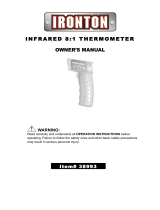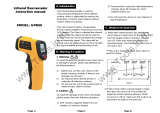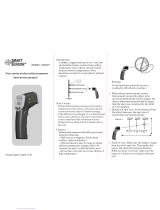Page is loading ...

D:S=12:1
6.67@80”
3@36”
2@24”
INF195
Infrared Thermometer
Controls and Indicators
1. Trigger: Initiates measurements.
2. IR Sensor
3. Laser Pointer Beam
4. LCD Display: Temperature
5. LCD Display: Secondary (MIN, MAX, AVG, DIF,
Alarm, Emissivity, Probe)
6. Battery Compartment
7. Thermocouple Socket
Displays and Indicators
Operating Instructions
Taking Measurements
To take a temperature measurement using your INF195, you
simply point the aperture at an object (with or without using
the laser sighting) and pull the trigger. The object’s
temperature will show up on the display and update at a rate
of approximately 2 times per second.
There will be a delay of approximately one-second between
the time you initially pull the trigger and the time the display
comes on. The 60-second auto-hold initiates at the moment
you release the trigger.
NOTE: This thermometer will automatically shut off if left
idle for more than 60 seconds, unless in PRB mode. When in
PRB mode, instrument will shut off if left idle for more than
12 minutes.
Follow these general guidelines to ensure you get the most
accurate readings possible:
• Besurethemeasuredobjectfillsthe“spot”seenby
the aperture. The distance to spot ratio for the INF195
is 12:1.
This shows the one-foot spot fitting within the one-foot tar-
get area. At this distance, and anything closer, the
target’s temperature will be accurately measured.
NOTE: If the two-foot diameter spot includes unwanted
objects in the background that are not part of the
one-foot square target. The temperature of the
background objects will be figured in with the target’s tem-
perature and throw off your measurement.
•Whencomparingtemperaturesofsimilarobjects
that are far away, take your measurements at the
same distance and angle to the target each time.
•Whenlookingforabnormallyhotorcoldtargetsit
may be acceptable to include background objects
so long as the temperatures in the background
and your methods are consistent.
•Considertheemissivityoftheobjectsyou
are measuring.
•Prepareasurfaceformeasurement.Infrared
thermometers measure only the outer surface of
an object. If emissivity is affecting the
measurement, or you have difficulty putting the
object in the sensors line-of-site, you may need to
prepare a surface that’s easy for the infrared
thermometer to read. A piece of masking tape is a
good target and it will rapidly take on the
temperature of the object it is attached to.
•Beawarethatyoucannotmeasurethe
temperature of air between the Infrared
thermometer and an object. Air vents (registers)
are quick to take on the temperature of outlet air.
However, you must aim directly at the vent if you
are measuring outlet air temperature.
•Keepyourinfraredthermometerawayfrom
strongelectricalfields.Whenworkingneara
strong electrical field, like that under the hood of
yourcar,watchforunusualreadingsoran“over
load”indication.Often,youcanmovethe
thermometer just a few inches to escape the
influence of the interference.
•KeepyourINF195withinitsuseandstorage
temperature range. Excessive heat or cold will
adversely affect the accuracy of your readings.
Whenthetriggerispulledthetarget’s
temperature will be displayed in a near real-time
mode (less than 1/2 second between
measurements). The temperature will remain
on the display for seven seconds after the trigger
is released.
Emissivity
Not all surfaces emit infrared energy at the same
level. A shiny surface will emit much less infrared
energy at a given temperature when compared to
a flat black surface. The INF195 has three preset
emissivity levels used to compensate for variances
in your target.
High (0.95) will work for most common surfaces
and is set as default for many infrared
thermometers. Medium (070) is best for oxidized
copper or rusty iron. Use Low (0.30) for surfaces
that emit less energy such as aluminum or brass.
Mode and Functions
Pressthe“MODE”push-buttonwillscrollthroughthe
following options:
: Emissivity data. (The default emissivity
is 0.95)
: Pressthe“MODE”push-button,thenpress
““or““push-buttonstosetthe
emissivity,thenpressthe“MODE”push-
button again to confirm it. The emissivity
can be changed between 0.30, 0.70 and
0.95.
: Pressthe“MODE”push-buttonforthe
maximum (MAX), minimum (MIN), different
between MAX and MIN (DIF) and average
(AVG) modes. During the measurement,
the special modes reading will be displayed
at the bottom of the display near the
mode icon.
: Pressthe““or““push-buttonsto
changethe“HighAlarm”(HAL) or
“LoAlarm”(LAL), then press the trigger to
confirm it. For example: when the reading
81˚F<LAL81.1˚F,thelow“LoAlarm”icon
will flash and you will hear a beep sound.
: Connectthethermocoupletothe
thermocouple socket and apply the probes
to the target being measured. The
thermometer will display the temperature
automatically without pressing any buttons.
To see the minimum or maximum data
during the probe measurement, please hold
downthe““or““push-buttons.
1-800-547-5740 • Fax: (503) 643-6322
www.ueitest.com • email: [email protected]
INSTRUCTION MANUAL
Introduction
The INF195 is perfect for frequent use in advanced or
specialty application environments, where wide tem-
perature ranges and superior optics are essential for
use on targets at greater distances. This full-featured
IR Thermometer is the most comprehensive and
best-valued Infrared Thermometer on the market.
The INF195’s increased features offer advanced trend
analysis for professionals that require a greater quality
of infrared optics, extended measurement and the ver-
satilityofaK-Typesurfaceorcontactprobeandthree
level emissivity to simplify operation.
Features include:
•–76°~1022°F(-60˚~550˚C)
•12:1DistancetoSpotRatio
•MIN/MAX/Differential,Average
•3emissivitylevels:(0.30,0.70,0.95)
•Hi/lowAlarm(Useradjustable)
•K-Typethermocoupleinput
•CarryCase
Safety Notes
Beforeusingthismeter,readallsafetyinformation
carefully.Inthismanualtheword“WARNING”isusedto
indicate conditions or actions that may pose physical haz-
ards to the user. The word “CAUTION”isusedtoindicate
conditions or actions that may damage this instrument.
NOTE: The INF195 is not recommended for use on
shiny surfaces such as chrome, mirrors or
polished metals.
WARNING!
To avoid thermal shock, the instrument should be
stored at room temperature between 32˚ to 122˚F (0˚
to+50˚C).
WARNING!
DONOTlookdirectlyintothelaserbeam.Permanent
eye damage may result.
1
4
5
2
3
6
7
INF195
1. Mode -button
2. Lock and Backlight
( ) Push-button
3. ˚F/˚C and Laser
( ) Push-button
4. Polarity
5. Main Display
6. Secondary Display
7 F˚ / C˚ Indicator
8. HOLD
9. Battery Life
D:S=12:1
6.67@80”
3@36”
2@24”
INF195
Infrared Thermometer
3
4
1
9
8
6
5
2
6
12

WARNING!
After measurement of high temperature, the probe
may be hot for a while.
Additional Features
Changing Scales
To change scales between degrees Fahrenheit
anddegreesCelsius,pressthebuttononthepanel,
(marked°F/°C),whilethedisplayisactive.Evenifthe
trigger is released and the display is in its 60-second
automatic hold, you can convert the reading between
scales. Each time you press the scale button, the
60-second hold will reset. The INF195 will default to
the scale last used the next time it is turned on.
Using the Laser Sight
TheINF195isclassifiedasa“LaserProduct”,andis
regulated by the FDA.
CAUTION!
Using controls, making adjustments, or performing
procedures in any manner other than that specified
herein may result in hazardous radiation exposure.
LCD Error Messages
The thermometer incorporates visual diagnostic
messages as follows:
:“Hi”or“Lo”isdisplayedwhenthe
temperature being measured is
outside the settings of HAL and LAL.
:“Er2”isdisplayedwhenthe
thermometer is exposed to rapid
changes in the ambient temperature.
:“Er3”isdisplayedwhentheambient
temperature exceeds the operation
rangeof32˚to122˚F(0˚to50˚C).The
thermometer should be allowed
plenty of time (minimum 30 minutes)
to stabilize to the working/room
temperature.
: For all other error messages it is
necessary to reset the thermometer.
To reset the thermometer, turn the instrument off, remove the
battery and wait for a minimum of one minute. Reinsert the
battery and turn it on. If the error message remains please
contact UEi service department for further assistance.
Battery Indicators
The thermometer incorporates visual low battery
indications.
: “BatteryOK”measurements
are possible
: “BatteryLow”batteryneedstobe
replaced, measurements are
still possible
: “BatteryExhausted”measurements
are not possible
Maintenance
Periodic Service
WARNING!
Repair and service of this instrument is to be performed
by qualified personnel only. Improper repair or service
could result in physical degradation of the instrument.
This could alter the protection from electrical shock and
personal injury this instrument provides to the operator.
Cleaning
Periodically clean your instrument’s case using a damp
cloth.DONOTuseabrasive,flammableliquids,cleaning
solvents, or strong detergents as they may damage the
finish, impair safety, or affect the reliability of the struc-
tural components.
Battery Replacement
Always use a fresh replacement battery of the specified
size and type. Immediately remove the old or weak bat-
tery from the meter and dispose of it in accordance with
yourlocaldisposalregulations.Oldordefectivebatteries
can leak chemicals that corrode electronic circuits.
To replace the battery:
1. Slide the battery cover straight down then away
from the INF195.
2.Replacewithfresh“AAA”(2x)batteries.
3. Replace cover.
Lens Care
The sensor lens is the most delicate part of the ther-
mometer.Thelensshouldbekeptcleanatalltimes.Care
should be taken when cleaning the lens using only a
soft cloth or cotton swab with water or medical alcohol.
Allowing the lens to fully dry before using the thermom-
eter. Do not submerge any part of the thermometer in
liquids.
WARNING!
UnderNOcircumstanceshouldyouexposebatteries
to extreme heat or fire as they may explode and cause
injury.
NOTE: This instrument contains no user serviceable
parts. If service becomes necessary, call UEi and ask for
the service department. See the warranty section of this
manual for additional details.
INF195
Infrared Thermometer
Limited Warranty
The INF195 is warranted to be free from defects in materials and work-
manship for a period of three years from the date of purchase.
If within the warranty period your instrument should become
inoperative from such defects, the unit will be repaired or replaced
at UEi’s option. This warranty covers normal use and does not cover
damage which occurs in shipment or failure which results from
alteration, tampering, accident, misuse, abuse, neglect or improper
maintenance.Batteriesandconsequentialdamageresultingfrom
failed batteries are not covered by warranty.
Any implied warranties, including but not limited to implied warranties
of merchantability and fitness for a particular purpose, are limited to
the express warranty. UEi shall not be liable for loss of use of the
instrument or other incidental or consequential damages, expenses, or
economic loss, or for any claim or claims for such damage, expenses or
economic loss. A purchase receipt or other proof of original purchase
date will be required before warranty repairs will be rendered.
Instruments out of warranty will be repaired (when repairable) for a
service charge. Return the unit postage paid and insured to;
1-800-547-5740 • FAX: (503) 643-6322
Service: (800) 308-7709
www.ueitest.com • Email: [email protected]
This warranty gives you specific legal rights. You may also
have other rights which vary from state to state.
Specifications
EMC/RFI
Readings may be affected if the unit is operated within
radio frequency electromagnetic field strength of
approximately 3 volts per meter, but the performance
of the instrument will not be permanently affected.
IR Thermometers
Infrared Thermometers measure the amount of thermal
radiation emitted from an objects surface. To take a
measurement, the object must be within the field of
view of the infrared thermometer, or the reading may
include objects surrounding your target. This target size
is determined in the distance to spot ratio stated on the
instruments specifications. At a ratio of 9:1, a distance
from your target of nine feet will give you a circle with
one foot diameter. At 20:1 ratio gives the same one foot
target now at 20 feet, so you can see that higher is
better, but typically more expensive due to the cost of
the optics involved.
The other common question is regarding emissivity. In
simple terms emissivity is a percentage of energy
emitted from a surface compared to the energy emitted
from a black body source. If a surface emits one half
(1/2 or 0.5) the amount of energy at a given temperature
and wavelength as a black body, it is said to have an
emissivity of 0.5.
Surfaces closest to the balck body level would be flat
black, and those farthest from it would be mirror or
chromesurfaces.Withasetemissivitylevelsome
surfaces may measure lower than actual, because their
surface is emitting less thermal radiation at a given
temperature. Although you may have a fixed emissivity
of 0.95, most items measured will provide a reasonably
accurate result. Having a fully adjustable emissivity will
give you the ability to fine tune your instrument to a
specific application.
To determine the emissivity of the surface being tested,
paint a portion with flat black paint, and then measure
the temperature of the painted area and compare it
to the temperature of the standard surface. Use the
following to determine the emissivity to use.
Temperature (Standard area) divided by temperature
(paintedarea).Asanexample61°inthestandardarea
and68°paintedis61/68or0.89
INF195-MAN11/11 Copyright©2011UEi
PLEASE
RECYCLE
D:S=12:1
6.67@80”
3@36”
2@24”
INF195
Infrared Thermometer
Item Non-contact Thermocouple Probe
Infrared Scan Scan
Measurement range -76˚ to 1022˚F -83.2˚ to +1999˚F
(-60˚to+550˚C) (-64˚to≠1400˚C)
Operatingrange 32˚to122˚F(0˚to+50˚C)
Accuracy ±2%RDGor2˚C(4˚F) ±1%ofreadingor1.8˚F
(Tobj=0~550˚C) whicheverisgreater (1.0˚C)whicheveris
greater (Test under
(Tobj=-60~0˚C) ((±2˚C(4˚F) Tamb=73±6˚F)
+ 0.05˚/per degree)
Resolution 0.1˚F/0.1˚C
(-9.9-199.9˚F)
Response time (90%) 1 second
Distance: Spot 12 : 1
Batterylife Standard“AAA”(x2),140hours
Dimensions 6.9”x1.5”x2.8”(175.2x39.0x71.9mm)
Weight 6.7oz
NOTE: Under the electromagnetic field of 2V/m from 200 to 600 MHz, the maxi-
mum error is 18˚F (10˚C).
INF195
“AAA” (x2)
Perform this first Verify that the meter Press to activate the following
is in one of these modes
Press and release In MIN, MAX, DIF, LOCK - Press the “ “ push-button for LOCK
the trigger to activate AVG mode mode ON/OFF - This locks the IR measurement
display first for up to 60 minutes
SCALE - Press “ “ push-button to select ˚C or ˚F
Press and hold In all modes except PRB BACKLIGHT/WORKLIGHT - Press the “ “
the trigger to use (Probe) push-button for backlight function ON/OFF
these functions LASER - Press the “ “ push-button for laser
function ON/OFF
/





